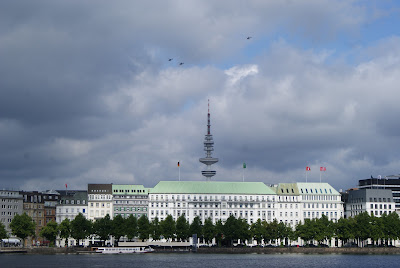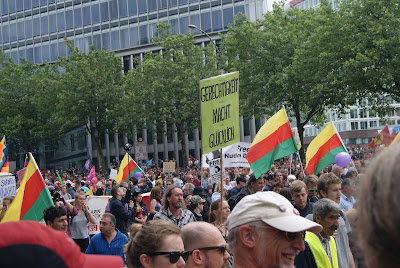A couple weeks ago, Hamburg made international news as it hosted the G20 summit. World leaders gathered to do some official schmoozing, put some incredible interpreters to the test, and talk about some important issues concerning (making assumptions here) the planet and how money moves around the planet. As an everyday mensch living in Hamburg without any sort of security clearance, I hardly paid attention to the diplomatic happenings of the week -- not because there wasn't plenty of media coverage about who said what and who shook whose hand for how long (or who got the swerve), but because there were so many other nutso things going on at the same time that required the majority of my attention span, not to mention emotional involvement. Thousands upon thousands of police were shipped into the city from all over to keep the peace as tens of thousands of protesters took to the streets in almost 30 officially registered protests over a span of a few days. Whole sections of the city around the summit areas were blocked off to everyone except those who could prove they lived there, roads were closed, and public transportation ceased to do any public transporting to certain areas. The constant drone of police and media helicopters circling low over the city for days on end, omnipresent police in full-on riot gear, and steady stream of sirens and flashing blue lights of police vans, armored vehicles, and tank-like water cannons made the city feel like it was under siege, and especially after the violence started, added to an underlying feeling of anxiety shared by everyone in the city. It was surreal.
Hamburg had been planning on huge protests ever since it was selected to host the event, and many of the protests themselves had been planned for at least that long as well. There were many, ranging from creative and beautiful to the anti-capitalism/globalism/everythingism protests that ended up getting violent and stealing all the attention. The names of the protests were a pretty good indicator of what was to be expected, for example the "Lieber tanz ich als G20" protest (very loose translation: "Screw the G20, let's dance!") was a rave where about 20,000 people peacefully bobbed up and down downtown to techno, wheras the "Welcome to Hell" protest was officially cancelled after a few short minutes when it was clear that shit was gonna go down, and ended with a police blockade and water cannons and injuries on both sides. Then there was the one where people met at the Kennedy bridge in the heart of the city to do a yoga protest in the early morning sun, or the colorful and self-explanatory "GAY20" (clever name in that "G" is pronounced somewhat like "gay" in German, ha, ha), or all the alternative summits and panels and lectures hosted by universities and cultural centers and theaters that brought in people from all over the world to talk about how real people can tackle big issues and reach out and to one another and recognize humanity across borders and love love peace peace and also hard things, and things that we need to work on as a society and as a planet.
The most visually striking protest I saw (not personally, as I only heard about it afterwards) was this one where about a thousand people came from all over Europe to create a 2-hour performance piece protesting how the values of our society have shifted away from human connections in pursuit of individual gain. Painstakingly caked in clay, they slowly and silently zombied through the streets, eventually helping one another break through the lonely monotony, peeling away the gray to reveal bright colors below, connecting with one another, laughing, embracing, whooping, dancing, and leaving heaps of dusty clothes scattered over the cobblestones. As the English version of their website says, "We cannot wait until change happens from the world's most powerful, we have to show political and social responsibility – all of us – now!" and "We want to put back in memory how compassion and public spirit conveys identity for a society. Our campaign is a further symbol for the fact that many people do not want to put up with the destructive impact of capitalism any longer. What will save us in the end is not our account balance but someone who will offer their holding hand."
That's adorable, but also beautiful, and unfortunately all the rest of the world saw about the G20 protests in Hamburg were images like this, of Altona and the Schanze aflame, of stores bashed in and looted, and masked individuals facing off against helmeted police, tensions high on both sides. While the world's top leaders were enjoying Beethoven's 9th in the sparkly Elbphilharmonie, protests were heating up nearby, and one of the main TV channels livestreamed both events. The splitscreen broadcast of the two very different but simultaneous events with the protest images on one side and dramatic music and tuxes on the other is somehow so fitting, so head-shaking, so hard to believe that this was a real thing that really happened in real life.
For all the thousands of people who flocked to Hamburg to peacefully march for issues important to them, there were a few hundred who came with the sole intent of breaking shit and generally wreaking havoc because, well, they're messed up and don't have a better outlet to deal with some serious personal problems. They claimed to be fighting capitalism and consumerism and ALL THE ISMS! and the government and corporations that oppress the "little guy", which I'm sure really are important issues to them, and which is obviously why they then proceeded to bash in not only the windows of whatever banks and stores that hadn't invested in G20 protection, but also whatever other windows they could find, and why they felt so compelled to run around smashing everything and setting cars on fire and slitting the tires of city bikes and destroying the property and services of normal, everyday people who are just living their lives the best they can and trying to get by. The fact that their violent actions had no impact whatsoever on the big guys tucked in safely at the Messehallen (save for a few tweets), and instead were hurting innocent people who might even agree with them to some extent on a lot of issues, didn't seem to bother them.
Seeing these images of these neighborhoods that I know and love was heartbreaking and frustrating and, even as I type this now, a couple weeks after the fact when everything has calmed down, I feel angry. Hamburg is my home and I get defensive when people pick on it or when a few rowdy rabble rousers give it a bad name. And, as an extremely privileged individual who was not at all negatively affected by these events other than my feelings getting hurt, let me just say that I cannot imagine what it is like for the millions of people in other parts of the world whose cities are burning, whose homes no longer exist, who have lost everything. I know that, and that's not what this is about.
At the same time, life continued as usual. On the Thursday before the official kick-off, I went to work, had an appointment at the bank, and then spent the evening with some neighborhood friends in the park, picnicking and noodling around on the guitar while getting updates via smartphone on the "Welcome to Hell" protest that was quickly getting out of hand at the harbor, a few short kilometers away.
Also on Thursday, the American president landed in Hamburg, as witnessed by everyone who saw his helicopters, and it felt so strange to sit in my apartment that night and know that he was less than two miles away from me, staying at the guest house of the senate after not being able to procure a hotel room in the city (some say because they waited too long to book one for him, some say because no hotels wanted to host him due to the security risk). I had Friday off from work as my department was being moved, though many companies (including mine) told their employees to work from home if they could, or just told them not to come in, as so much of the city was shut down for the summit. The weather was lovely and I didn't want to stay cooped up inside all day, so I went downtown for a while to walk around and see what was going on. It was a ghost town, if all the ghosts were police. Many stores looked like they were bracing for a hurricane, some of which were still open for part of the day, though most of them were closed. I watched as seemingly endless parades of police vehicles drove this way and that, strategically parking to block roads, positioning water cannons to drive wherever needed at a moment's notice, and helicopters flying around and around the whole time. Again, it was surreal. After a couple hours of exploring, the police all started zooming in the same direction I was walking, which I took as my cue to take a train home before the trains stopped running. I was pretty creeped out.
Some more yoga protesting:
On Saturday I heard last-minute that the mayor of NYC was speaking at a theater downtown, as a kind of G20 protest/offering an alternative American voice to the one sitting at the big kids' table, so I went to that and then joined thousands of other peaceful protesters for the Hamburg zeigt Haltung (loosely translated: "Hamburg is actually mature and composed and perfectly capable of holding a march without setting shit on fire. Also we like peace.") protest. The police were visibly at the ready the whole time, but didn't interfere.
Let the people chant "Ein hoch auf die internationale Solidarität"!
These big guys in pink pussy hats were eating ice cream:
There is enough love for everyone:
This kid had colored a pretty sign for borderless solidarity:
"G20 in Hamburg? Terrible idea! Ever heard of Skype?"
Justice = happiness:
Part of the protest route led along the harbor where previous protests had gotten out of hand. Now people rolled their biycles and wheelchairs and baby strollers over places where barricades had been set on fire a short time before, plastic still fused with cement, with twisted fences and burned out garbage cans standing nearby.
Hundreds of people volunteered to carry the "Hamburger Weltschal", or Hamburg's "world scarf" -- a handmade banner consisting of the flags from all the world's nations sewn together.
Peaceful protest is what brings us together, makes us one:
It was a wonderful, heart-warming event, and soon afterwards, more violence broke out in other parts of the city. The G20 had officially ended and I and many other people breathed a sigh of relief when we saw the entourage of helicopters carrying the American president fly over and out of the city, and still the violence continued into the night.
The next morning, however, thousands of people gathered in the hardest hit areas with brooms and trash bags and cookies and cleaned the streets and sidewalks and walls until they were cleaner than ever before (seriously), and in many interviews talked about how Hamburg should not be defined by the violence, how the city and the people who live there are peaceful and open to the world. Museums opened their doors, offering free admission all day. Coffee shops and florists offered free coffee and bouquets to police for their service. I would imagine that random acts of kindness skyrocketed. The whole city came together to say hey, this is who we are, and offered a holding hand.

































